Education
Washington State Parenting Plan for Unmarried Parents
Navigate the complexities of creating a Washington State parenting plan for unmarried parents with our guided expertise.

Fun fact: In Washington State, family structures are shifting, with many kids born to **unmarried parents**. Understanding the **legalities around parentage** is super important with this trend. Washington State has a detailed system where **parenting plans** are right there in the law. These plans act as a **cornerstone**, providing a strong future for kids born outside of marriage.
As part of our commitment to serving the families of Washington State, we delve into this process that starts with filing a paternity acknowledgment, which then gets filed with the Washington State Registrar of Vital Statistics. Once this acknowledgment is recognized, which could be anywhere from 60 days to over four years post-signing, it acts as a springboard for parents to petition for a parenting plan, residential arrangement, or child support guideline adherence.
A vital point for unmarried parents to note is that the state provides a bevy of forms related to summons, sealed birth certificates, confidentiality, and proofs of personal service. These forms are not only readily accessible but are routinely updated, reflecting the state’s resolve to keep parenting plan processes both modern and approachable. Therefore, this structured system upholds the interests of both the child and the parents asserting their legal rights and responsibilities.
Meet us on the journey to cover this essential subject. Together, we’ll explore how Washington State is facilitating and streamlining the process of creating a Parenting Plan Washington State specifically designed for unmarried parents.
Key Takeaways
- Acknowledgment of paternity is crucial and can define the timeline for unmarried parents to seek a parenting plan.
- Washington State’s legal system is committed to keeping parenting plan processes accessible through regular updates and accessible forms.
- Filing with the Washington State Registrar of Vital Statistics is a pivotal step for unmarried parents to formalize their roles.
- Parenting Plan Washington State provides clear guidelines to be followed by unmarried parents for the welfare of their children.
- The state offers a breadth of resources, such as forms for various needs including residential schedules, confidentiality, and legal summons.
- The process demonstrates a balance of protecting the rights of the child while also respecting the interests of the unmarried parents involved.
Understanding the Parentage Petition Process in Washington State
In the pursuit of establishing a stable and legally recognized family structure, unmarried parents in Washington State must navigate the intricacies of the legal system, particularly in securing a parenting plan. As this process begins, understanding and initiating the correct procedures are fundamental to ensuring the desired outcomes for both the parents and their children.
Steps to Start the Case for Parenting Plan
The initial step in formalizing parental rights and responsibilities starts with the filing of the Petition for Parenting Plan. This document, crucial for setting the legal framework of parental engagements, needs to be duly filled and submitted alongside summons notices. The acknowledgment of these documents by the court sets the stage for subsequent legal proceedings. It’s essential that all parties understand that launching this petition marks the beginning of a potentially transformative legal journey.
The Role of Legal Paternity in Parenting Plan Petitions
The Acknowledgment of Parentage forms the cornerstone of legal paternity and its subsequent recognition within the jurisdiction of Washington State. This acknowledgment enables either parent to file a Washington State Parentage Petition, thereby asserting their rights and responsibilities towards their child. As the court recognizes this established paternity, it progresses to delineate the specifics of the parenting plan, including residential schedules and child support arrangements, which are crucial for the child’s upbringing and welfare.
In summary, navigating the parentage petition process requires a precise understanding of the paperwork involved, especially the critical nature of the acknowledgment of parentage form FL Parentage 329. Filing this form correctly and promptly ensures that the legal system adequately captures the parental intentions and rights from the outset.
Establishing Paternity for Parenting Rights in Washington
In our commitment to ensuring Unmarried Parents Rights in Washington, it is crucial to address the need for Establishing Paternity as a foundation for securing equitable parenting rights and responsibilities. The legal framework in Washington State mandates that paternity be established for unmarried fathers to share in the parenting responsibilities and rights equitably.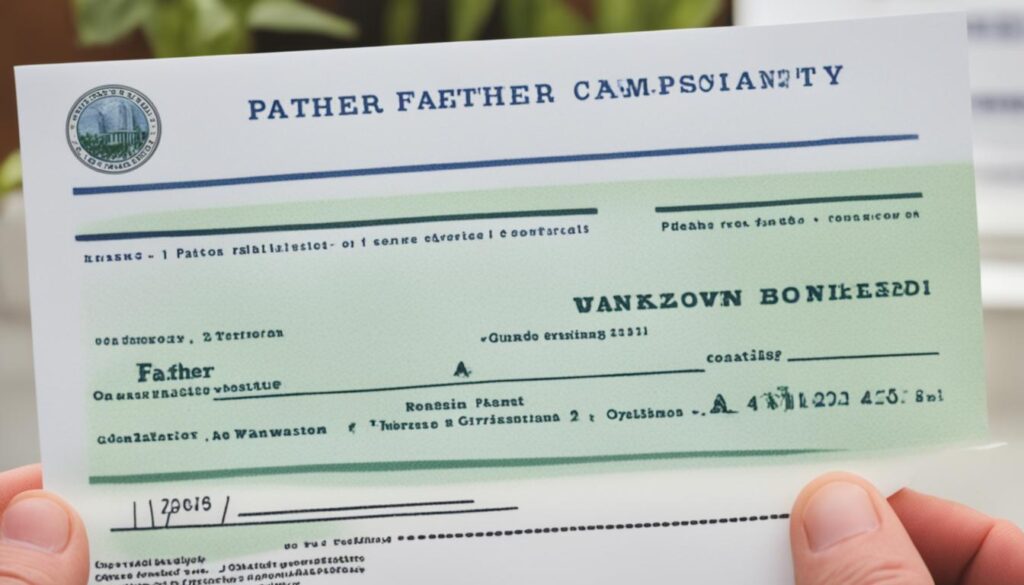
Establishing paternity not only secures a father’s rights but also fortifies the child’s right to receive support from both parents. This is especially significant in discussions involving parenting rights and responsibilities, where each parent’s involvement plays a pivotal role in the child’s development and well-being.
- Acknowledgement of Paternity Form
- Court Petition for Establishing Paternity
- DNA Testing Arrangements
By establishing paternity, both parties gain clarity and formal recognition, which is the first substantial step towards crafting a parenting plan that respects the rights and responsibilities of each parent. A well-defined Parenting Plan outlines important factors such as primary residence, visitation schedules, and shared decision-making responsibilities.
If you are navigating the complexities of parenting rights and responsibilities in Washington State, understanding the importance of establishing legal paternity is pivotal. This ensures that all subsequent agreements will stand on a clear and legally recognized foundation, thereby protecting the interests of all parties involved—most importantly, the children.
Navigating Forms and Documents for Parenting Plans
Managing the paperwork involved in creating a Parenting Plan in Washington State can seem daunting. However, with a clear understanding of what documents are required and their specific deadlines, we can streamline the process effectively. Our focus on Parenting Plan Documentation, meeting Filing Deadlines, and using the correct Washington State Parenting Forms ensures a smoother journey towards securing a comprehensive Parenting Plan.
Compulsory Forms for Unmarried Parents
The initial steps towards formulating a Parenting Plan involve gathering and completing several mandatory documents. These forms serve as the backbone of the legal process and are indispensable for both parties involved. It’s crucial to ensure that all documentation is accurately filled to avoid any delays or legal setbacks.
Timing and Deadlines for Filing Forms
Adhering to filing deadlines is just as critical as the documents themselves. Each form associated with the Parenting Plan has a stipulated deadline, which must be met to ensure the process moves forward without any hindrance. Keeping track of these deadlines can prevent unnecessary delays in the establishment of a Parenting Plan, allowing all parties to proceed with clarity and confidence.
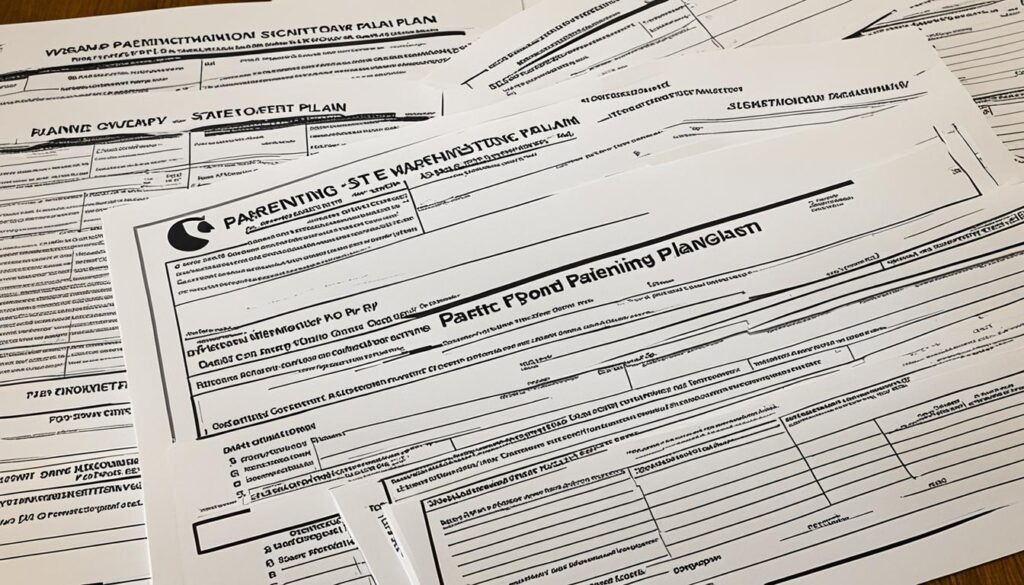
Understanding the sequence and requirements of Parenting Plan Documentation aids in preparing better for the steps ahead. By staying informed about the necessary Washington State Parenting Forms and keeping ahead of Filing Deadlines, we can help minimize stress and uncertainty throughout the process of formalizing a Parenting Plan.
Washington State Parenting Plan for Unmarried Parents
In Washington State, our efforts are wholeheartedly focused on guiding unmarried parents through the process of formulating a comprehensive Washington State Parenting Plan. These plans are crucial in ensuring that all parental responsibilities and rights are recognized and responsibly executed. Legal resources and the assistance of courthouse facilitators play significant roles in this respect.
For those seeking Legal Advice for Unmarried Parents, our state offers extensive services to clarify the legal implications and requirements of parenting plans. These services help align both parents with the state’s legal standards and protect the best interests of the child. Furthermore, Courthouse Facilitator Assistance is available to ensure that all necessary paperwork is completed accurately, reinforcing the plan’s legal strength.
| Resource | Service Provided | Benefit to Unmarried Parents |
|---|---|---|
| Legal Advice Clinics | Guidance on parenting plan drafting | Ensures comprehension of legal rights and responsibilities |
| Courthouse Facilitators | Assistance with form submission and procedures | Facilitates accurate and timely paperwork processing |
As we continue our journey towards fostering environments where every child and parent relationship is validated and supported, it is essential to widely communicate the availability of these resources. It is through the due diligence of each participant in the creation of a Washington State Parenting Plan that unmarried parents can experience a relatively seamless transition into co-parenting, even in the absence of a traditional nuclear family structure.
Temporary Arrangements: Parenting Plans During the Case
In matters of family law, particularly when a parenting case is active, securing stability for the children involved is paramount. In Washington State, this security can be provisionally maintained through Temporary Parenting Plans and Family Law Orders. These legal measures afford children a routine and safe environment while the more permanent solutions are deliberated in court.
Filing for Temporary Family Law Orders
When parents agree or when conflict necessitates quick action, filing for Temporary Family Law Orders is the initial step. This can include setting up temporary custody arrangements that outline who the children will live with and the visitation rights of the non-custodial parent. Such orders aim to provide an immediate structure for the child’s daily life, ensuring their routine is affected as little as possible during legal proceedings.
Utilizing Immediate Restraining Orders for Protection
In cases where there is an immediate threat to the safety of one parent or the children, Restraining Orders Washington State courts can issue Immediate Restraining Orders. This swift action is crucial in preventing harm and maintaining the wellbeing of all involved parties. It not only restricts contact and proximity but also sets clear legal repercussions for violations, thereby bolstering the safety framework around vulnerable parents and children.
The role of these temporary measures is not only to protect but also to provide breathing room for parents as they work towards finalizing the details of their Parenting Plan. Until the final orders are established, these temporary arrangements help prevent any significant disruption in the child’s life and routine, making the legal process less stressful for younger members of the family.
Securing the Child’s Well-Being: Residential Schedule and Support
Ensuring the optimal development and well-being of children is a key priority when unmarried parents design a parenting plan in Washington State. A well-structured child’s residential schedule allows both parents to effectively contribute to their child’s upbringing in a balanced and meaningful way. This is supported by the child support calculation, which ensures financial obligations are met adequately according to the costs associated with raising a child.
Designing a Residential Schedule
Creating a child’s residential schedule is essential for providing a stable environment. Both parents are involved in developing a schedule that suits the child’s schooling, health needs, and extracurricular activities, aiming for a minimum disruption to the child’s daily routine. It’s crucial for this schedule to also accommodate the geographical and work-related constraints of each parent, making sure that all bases are covered for the child’s benefit.

Understanding the Washington State Child Support Schedule
The Washington State child support schedule is designed to outline what financial responsibilities each parent will have. It provides a comprehensive framework that considers each parent’s income, the child’s healthcare, educational expenses, and other essential needs. It’s vital for parents to understand this aspect thoroughly to ensure they are prepared to meet these financial commitments.
Calculations are based on various standards like shared income and the number of children, which ensure that child support is fair and meets the child’s needs without causing undue hardship to either parent.
With this dual focus on creating an effective residential schedule and understanding child support guidelines, unmarried parents can help secure a healthier, more stable future for their children in Washington State.
Finalizing Your Parenting Plan in Washington Courts
As you approach the culmination of your parenting plan process in Washington State, it’s essential to understand the critical steps involved in finalizing the arrangements through the court system. Ensuring compliance with legal protocols for Final Orders for Parenting Plan and Child Support Orders can significantly influence the stability and effectiveness of the plan you establish for your child’s upbringing.
Steps to Schedule the Final Hearing
Scheduling the Final Hearing Washington State is pivotal. This crucial step involves filing the Notice of Hearing form, which sets a date for the court to review and approve your parenting plan. It’s important to file this form within the stipulated timelines prescribed by the court to avoid unnecessary delays.
Obtaining Final Orders for Parenting Plan and Support
Once the final hearing is set, the court will review all provided documents and testimonies to issue the Final Orders for Parenting Plan and Child Support Orders. These orders legally bind both parties to adhere to the terms set out concerning child custody, visitation, and support.
| Document Type | Purpose | Submission Deadline |
|---|---|---|
| Notice of Hearing | To schedule the court date for the final hearing | At least 30 days before the desired court date |
| Parenting Plan Proposal | To outline the terms of child custody and visitation | Filed together with the motion for final hearing |
| Child Support Worksheet | To calculate the financial support responsibility | Filed prior to the final hearing date |
We advocate ensuring all documents are thoroughly reviewed and accurately completed before submission. The successful issuance of Final Orders for Parenting Plan and Child Support Orders will provide a solid framework for your parental responsibilities and contribute to the well-being of your child.
Legal Resources and Support for Unmarried Parents in Washington
In Washington, navigating the complexities of parenting plans as unmarried parents can be challenging. Thankfully, a plethora of Legal Resources Unmarried Parents exist to provide invaluable support. Among these resources, CLEAR Legal Referral plays a critical role. This service offers connections to lawyers and legal assistance, specifically tailored to support the unique needs of unmarried parents working through the parenting plan process.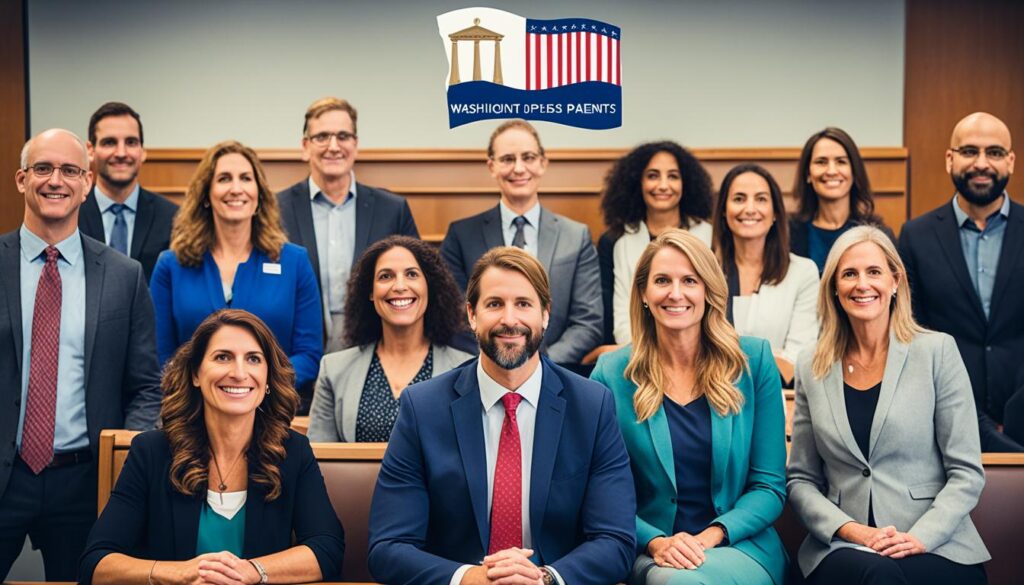
Coupled with CLEAR, the assistance from Courthouse Facilitator Washington proves integral for those seeking guided help within the legal system. Courthouse facilitators especially offer support to those who might not be able to afford traditional legal representation, ensuring access to necessary legal guidance is not hindered by financial constraints.
| Resource | Service Provided | Target Audience |
|---|---|---|
| CLEAR Legal Referral | Legal advice and lawyer referrals | Unmarried Parents |
| Courthouse Facilitator | Guidance and help with court procedures | Low-income individuals |
We understand the importance of both parents having the means to facilitate a fair and effective parenting agreement, which comprehensively considers the welfare of their children. By leveraging such resources as CLEAR Legal Referral and Courthouse Facilitator Washington, unmarried parents are better equipped to navigate the intricate legal landscape and establish a parenting plan that best serves the needs of their children.
Protection Orders and Safety Measures During Parenting Plan Cases
When undergoing parenting plan cases in Washington State, ensuring the safety of all parties involved is paramount. In circumstances where one party may pose a threat to the children or other parent, the state provides mechanisms such as Protection Orders and Immediate Restraining Orders. These legal tools are crucial in safeguarding the well-being of families during these sensitive proceedings.
When and How to Request a Protection Order
A Protection Order is one of the essential safety measures in parenting cases, aimed at preventing further harm or harassment by one party against the other. In Washington State, a party can request such an order at any courthouse as part of the parenting plan process. This ensures that the affected individuals are shielded from immediate dangers while the case is active.
Procedure for Immediate Restraining Orders
Similarly, an Immediate Restraining Order Washington State can be pursued if there’s an imminent threat. These orders can typically be issued without prior notice to the other party, allowing law enforcement to intervene swiftly to ensure safety. Such orders are a pivotal component of the state’s dedication to maintain peace and protection in contentious family dynamics.
| Type of Order | Circumstances | Issuance Speed | Duration |
|---|---|---|---|
| Protection Order | Threat of harm or harassment | Varies by case, typically a few days | Up to 1 year, extendable |
| Immediate Restraining Order | Immediate threat | Issued on the day of request | Temporary, until full hearing |
For parents navigating through the complexities of a Parenting Plan in Washington State, understanding and utilizing these Protection Orders and Immediate Restraining Orders is crucial. These legal provisions ensure that while the legal details are being sorted, safety and peace are maintained, protecting both the child’s and parents’ well-being.
What Happens When Parentage is Contested by Unmarried Parents
When navigating the complexities of family law in Washington State, situations may arise where the parentage is contested by one party. This triggers a specific legal procedure that can impact the structure and execution of parenting plans. Understanding these procedures helps ensure that both parties are prepared for the possible outcomes and know how to proceed.
Dismissal and Challenge to Acknowledgement of Paternity
In cases where Contested Paternity arises within two years after the Acknowledgment of Paternity has been filed, the acknowledgment itself may be subject to dismissal or legal challenge. This is a crucial stage where the challenge of the Acknowledgement of Paternity can set the precedent for further parental rights and responsibilities.
Navigating the Denial of Parentage Procedures
Initiating the Denial of Parentage Procedures involves meticulous navigation through the legal landscape to ensure that all parties’ rights are respected. This includes filing specific forms tailored to contest parentage, and potentially engaging in court proceedings to resolve the matter effectively.
| Procedure | Description | Impact on Parenting Plan |
|---|---|---|
| Legal Challenge | Filing objection to the Acknowledgment of Paternity within the legally stipulated timeframe. | May pause or alter existing parenting plan arrangements until resolution. |
| Court Intervention | The case may be escalated to court for a decision on the contested parentage. | The court’s decision may redefine parental roles and rights. |
| Completion of Forms | Specific legal forms must be completed to officially contest parentage. | Ensures that all legal requirements are met for a valid contestation. |
Our goal is to assist parents through the complexities of Denial of Parentage Procedures and the Challenge Acknowledgement of Paternity, ensuring that their rights and the welfare of the child are maintained throughout the process. Ensuring a thorough understanding of these processes is essential for all parties involved in contested paternity cases.
Conclusion
As we reflect on the complexities of parenting plans in Washington State, it is clear that the state has put forth a comprehensive approach to uphold the rights of unmarried parents and safeguard the welfare of children involved. The establishment of a well-documented and effective parenting plan stands as a testament to Washington’s commitment to facilitating the resolution of parental responsibilities. Our understanding of the vital steps in this process ensures that we appreciate the attention given to Washington State unmarried parent rights.
The resources available offer outstanding support for unmarried parents, easing the challenges that come with navigating the legal landscape of parenting agreements. State-provided forms, accessible legal advice, and the presence of experienced courthouse facilitators present unprecedented assistance to those in need. This robust framework enables the development of effective parenting plans, which are instrumental in fostering an environment where children can thrive under the nurturance and guidance of both parents.
Ultimately, the goal of our collective efforts is to enhance the lives of children and parents alike. By staying informed and utilizing the support systems offered, we empower ourselves to construct arrangements that best reflect the unique dynamics of our families. In doing so, Washington State becomes a leading example of proactive support for unmarried parents, working systematically to champion the creation of constructive and amicable parenting plans. As we move forward, let us continue to uphold the values that prioritize the best interests of our children and the integrity of the family structure.FAQ
How can unmarried parents in Washington State file for a Parenting Plan?
What is the importance of legal paternity in the Parenting Plan process?
What are the rights of unmarried parents in Washington State?
What forms are required for an unmarried parent to file a Parenting Plan in Washington?
How can unmarried parents receive legal advice when filing for a Parenting Plan?
What are Temporary Family Law Orders, and how do they apply to Parenting Plans?
How is child support calculated in Washington State?
What are the steps for finalizing a Parenting Plan in Washington?
What legal resources are available for unmarried parents going through the Parenting Plan process?
When can a Protection Order be requested during a Parenting Plan case?
What happens if parentage is contested after an Acknowledgment of Paternity is filed?
How does Washington State ensure the well-being of the child in a Parenting Plan?
Education
Creative Parenting Workshop Ideas to Inspire You
Discover innovative parenting workshop ideas with us to energize and engage parents on their journey. Learn strategies for effective family growth.

Did you know **parents with kids under 18** often join personal learning activities more than others? Pew Research Center backs this claim, presenting a fantastic opportunity to create workshops that **enhance the parenting community** with exciting and new experiences. Parenting today is super challenging, so these workshops focus on building skills in a **supportive environment**. Think of moms and dads trading stories, sharing advice, and learning together. A workshop like this brings everyone closer and helps them grow.
Workshops, an amalgamation of interactive dialogue and collaborative tasks, are an invaluable tool in our pursuit to meet these needs. Our workshops are thoughtfully designed to gather individuals around communal parenting goals, providing a space where expertise is shared, and both practical and theoretical knowledge flourishes. In today’s fast-paced world, a significant challenge lies in capturing and maintaining one’s attention, but ours are expertly crafted to offer parenting community engagement and learning that sticks. We ensure that each workshop leverages group dynamics and hands-on learning to cultivate an environment that truly promotes and celebrates growth in all forms—personal, familial, and communal.
We invite you to explore a realm where creativity and learning coalesce, promoting the development of diverse competencies—from the practicalities of daily parenting to the subtleties of communication and beyond. Join us as we embark on a journey to empower parents through dynamic learning experiences.
Key Takeaways
- Interactive workshops can significantly contribute to lifelong learning, especially among active parents.
- Parents are keen to invest time in personal development, illustrating a strong desire for skill enhancement.
- Workshop facilitation must emphasize both the acquisition of knowledge and the nurturing of a supportive community.
- A learning environment rich in hands-on activities and group discussions has a greater impact on engagement and knowledge retention.
- Parenting workshops serve as an excellent opportunity for parenting community engagement, helping parents to navigate challenges together.
Exploring the Essentials of Engaging Parenting Workshops
At the core of successful parenting workshops, you’ll find a rich blend of interactive learning, designed to engage participants actively. These sessions are structured to foster an environment where expert guidance seamlessly integrates with real-time problem solving, promoting a workshop experience where knowledge leaps from theory to immediate workshop application.
Our workshops are renowned for their vibrant networking opportunities. We make it simple and natural for attendees to forge new connections with fellow parents facing similar challenges and milestones. Such networking becomes a gateway to lasting friendships and invaluable support networks, illustrating the inherent value of collaborative experiences in learning and personal growth.
- Interactive sessions that encourage hands-on participation
- Expert-led discussions that address actual parenting scenarios
- Opportunities for live feedback and collaborative problem-solving
- Immediate application of strategies discussed in the workshop
We understand the importance of a supportively structured setting in which parents can delve into pertinent subject matter, ask questions directly to field experts, and gain the confidence needed to apply new skills immediately. It is through this structured, interactive framework that our workshops make a meaningful impact on the everyday lives of participants.
Boosting Parent Engagement Through Creative Event Planning
In our pursuit to advance employee skill growth and engagement, we recognize the power of corporate workshops. These events are not just about knowledge dissemination; they’re strategic platforms aimed at nurturing employee wellness and promoting upskilling in a diverse array of fields including coding, team-building, and more.
By integrating a variety of engaging topics such as photography, public speaking, and data science into our workshops, we cater to wide-ranging interests, ensuring that every participant finds value and motivation to grow personally and professionally. This variety not only enhances the learning environment but also boosts overall workplace morale and productivity.
- Photography workshops spark creativity and enhance technical skills, valuable in both personal and professional contexts.
- Coding sessions encourage logical thinking and problem-solving abilities, critical in today’s digital era.
- Team-building exercises improve communication and collaboration, essential for a harmonious corporate culture.
- Public speaking workshops boost confidence and improve presentation skills, empowering employees to articulate ideas effectively.
Our commitment extends beyond organizing these workshops; we ensure they are interactive and practically beneficial for both individual growth and collective success. This strategic approach to corporate workshops not only contributes to employee wellness but also aligns with our organizational objectives, making every workshop an investment in our future.
Capturing Memories: The Role of Photography in Parent Workshops
In the realm of parenting workshops, the integration of photography is not merely about snapping pictures but about mastering content creation through enhanced camera settings, innovative lighting techniques, and artistic storytelling. We delve into the specifics of each to empower parents with the skills to capture compelling and heartwarming family moments.
| Topic | Description | Key Benefits |
|---|---|---|
| Camera Settings | Understanding the technical aspects including aperture, shutter speed, and ISO. | Enables precision and control over photo quality and clarity. |
| Lighting Techniques | Exploring the use of natural light and professional equipment for ideal illumination. | Enhanced mood and texture for storytelling. |
| Artistic Storytelling | Composing images that narrate a compelling story beyond the visible. | Captures emotional depth, enhancing the connection with the audience. |

Each element of photography, from setting up your camera to framing the perfect shot, combines to create meaningful content that resonates deeply with viewers. Our interactive sessions provide hands-on learning to apply these techniques effectively, ensuring every parent can leave our workshops confident in their ability to document life’s precious moments.
- Hands-on exercises with immediate feedback.
- Scenario-based learning to improve real-life application.
- Community sharing sessions for aspiring parent photographers.
We strive to empower parents not just to record memories, but to tell their unique stories through visuals, transforming everyday moments into a beautifully curated collection that celebrates family life. Join us as we explore the infinite possibilities of photography in capturing not just images, but emotions and stories that bind us.
Integrating Coding: Empowering Parents in the Digital Age
As we delve deeper into the digital era, the demand for coding skills and web development knowledge becomes increasingly indispensable. Our parenting workshops now include coding boot camps designed to enhance digital literacy and provide robust training in data analysis. These programs are tailored to equip parents with the technological prowess necessary to navigate and succeed in a digitally-driven world.
We understand that not every parent has a background in technology, which is why our coding boot camps are structured to accommodate all levels of experience. From beginners to those looking to refine their expertise, our camps utilize practical approaches to learning, ensuring that every participant can follow along and benefit from the training.
| Program Type | Focus Area | Technologies Covered | Duration |
|---|---|---|---|
| Beginner | Introduction to Coding | HTML, CSS, JavaScript | 4 Weeks |
| Intermediate | Web Development | React, Node.js | 8 Weeks |
| Advanced | Data Analysis | Python, SQL | 12 Weeks |
This integration of coding into our workshops not only boosts the technological skills of parents but also fosters an environment of continuous learning and development. By closing the digital divide, we empower parents to actively participate in the rapidly evolving tech landscape, enhancing both their personal and professional lives.

In conclusion, embracing coding and digital technologies through our specialized boot camps enables parents to gain valuable skills that are essential in today’s workforce. It’s about more than just learning to code; it’s about building a foundation for future learning and ensuring that our children grow up in a digitally literate household.
Strengthening Families with Team Building Activities
At the heart of a thriving family lies the spirit of team harmony, essential for creating a cohesive and supportive home environment. Recognizing this, we’ve tailored team-building workshops designed to enhance not only effective communication but also problem-solving skills among family members. These workshops are pivotal in strengthening the familial bonds through shared experiences and collaborative challenges.
Through carefully crafted activities, our workshops encourage participants to actively engage with each other, fostering essential skills such as empathy, listening, and mutual support. The backbone of these sessions revolves around activities that not only excite but also challenge participants to think collectively and strive towards common goals.
| Activity | Skills Enhanced | Expected Outcome |
|---|---|---|
| Communication Relay | Effective Communication | Enhanced family communication and understanding |
| Problem Solving Quests | Problem-Solving | Improved decision-making and conflict resolution |
| Trust Circles | Team Harmony | Strengthened trust and emotional connectivity |
Incorporating these activities into regular family routines not only builds skills but also contributes to creating a harmonious and supportive environment where every member feels valued. Let us guide you through these transformative experiences, ensuring that your family not only grows together but also enjoys each step of that journey. Embrace the opportunity to foster a strong, communicative, and problem-solving family unit.
Enhancing Communication: Public Speaking Workshops for Parents
At our workshops, we focus on elevating the presentation skills of parents, enabling them to engage more effectively with educators and other stakeholders in their children’s education. These sessions are tailored to break down communication barriers and boost confidence through structured impromptu speaking and role-playing scenarios.
Building Confidence Through Impromptu Speech Exercises
Impromptu speaking is a vital component of our public speaking workshops. We create a supportive environment where parents can practice thinking on their feet, enhancing their ability to articulate thoughts and responses without preparation. This practice not only improves presentation skills but also prepares parents for unplanned stakeholder engagements, where immediate responses are often necessary.
Role-Playing for Effective Parent-Teacher Communication
Role-playing scenarios are integral to our workshops. These exercises simulate real-life interactions with teachers, allowing parents to practice and refine their communication strategies. By role-playing various stakeholder interactions, parents gain practical experience in handling diverse conversational contexts, which can significantly improve their engagement and advocacy in educational settings.

- Sharpening presentation skills through practical experience
- Gaining confidence to manage spontaneous stakeholder engagement
- Practicing real-world dialogues through role-playing
In these workshops, parents leave better equipped to handle a variety of communication challenges, ensuring their participation is impactful and their voices are heard in crucial discussions surrounding their children’s education.
Interactive Learning: Conducting Product Demos as Parent Workshops
When we consider the transformative power of interactive learning in parent workshops, the focus shifts organically towards a deep product understanding driven by direct, hands-on experience. By embedding product demonstrations within these workshops, we magnify the relevance of customer needs while simultaneously simplifying service application, all within the nurturing background of a parent workshop.
These demo sessions are structured meticulously around the products’ core features and functionalities, ensuring that every participant leaves with a substantial grasping of how these offerings can be seamlessly integrated into their daily lives. This approach not only caters to enhancing knowledge but also solidifies the utility of the demonstrated products concerning real-world challenges faced by parents.
Engaging directly with the products increases confidence in their application, fostering a loyal and informed customer base.
To illustrate the successful integration of product demos into parent workshops, consider a cooking class where parents could learn how to utilize a new kitchen gadget. This not only serves to demonstrate the product but also allows attendees to experience the practical benefits firsthand, ensuring that the product features are fully appreciated and understood.
| Workshop Type | Product Used | Key Benefit | Customer Feedback |
|---|---|---|---|
| Cooking | Multi-use Kitchen Blender | Efficiency in meal preparation | Enhanced ease of use and quick setup |
| Baking | Advanced Oven | Consistent baking results | High satisfaction with product reliability |
| Home Automation | Smart Home Devices | Automation of daily tasks | Positive impact on time management |
Through such interactive sessions, each participant’s hands-on experience is leveraged to foster not only a comprehensive understanding of the product but also to highlight how these innovations meet specific customer needs, culminating in a high-value service application in everyday contexts.In sum, these interactive product demos embody an innovative teaching and learning method that resonates with the practical necessities and lifestyle enhancements pivotal for today’s parents.
Decoding Data: Data Science Skills for Savvy Parents
In today’s data-driven world, the ability to understand and manipulate data is invaluable, not just in business but in everyday decision-making. Our workshops on data science training are designed to empower parents with the necessary knowledge to make informed decisions and to grasp the basics of machine learning and data analysis. Let’s dive into how these skills are applicable across various scenarios, from improving personal finances to enhancing one’s professional capabilities.
Data science training equips participants with the tools to analyze and interpret complex data, which is essential for robust business decision-making. The practical applications of this training are vast, encompassing everything from understanding consumer behavior to optimizing business processes.
- Introduction to Python and SQL: Gaining familiarity with these tools for effective data manipulation.
- Statistical Analysis Techniques: Understanding data distributions, variability, and applying hypothesis testing.
- Visualization of Data: Using graphs and plots to make sense of trends and patterns.
- Machine Learning Basics: Automated data analysis for predicting outcomes.
By nurturing these skills, parents not only enhance their professional profiles but also develop the acumen to apply data analysis in daily problem-solving scenarios. Whether it’s choosing the best school for their children based on performance metrics or optimizing household budgets, the applications are endless.
Here’s what some of our workshop participants have to say:
“Learning data science has not only helped my career but has also made me a better, more analytical thinker in my personal life. I can’t recommend these workshops enough!”

Our goal is to make these technologies accessible and understandable, ensuring that parents can lead in innovation and strategic thinking within their families and communities. Join us as we demystify machine learning and data analysis, enabling more savvy and strategic family leaders.
Charting Futures: Career Development Strategies for Parents
In the evolving landscape of professional growth, we recognize the importance of equipping parents with the tools for successful career path navigation. Our curated career development workshops excel in fostering essential skills such as personal branding, sharpening interview skills, and overall professional development.
These workshops are not just about skill acquisition; they are intriguing platforms for networking and collaboration that directly enhance career trajectories. We help you harness your strengths and position yourself effectively in a competitive job market.
Personal branding is more critical today than ever. It’s about carving out a distinct presence in your professional sphere, which resonates with your true potential and career aspirations. Meanwhile, adept interview skills allow you to articulate those capabilities compellingly, guaranteeing that opportunities are not lost due to a lack of communication prowess.
| Workshop Module | Skills Enhanced | Outcome |
|---|---|---|
| Personal Branding Mastery | Online Presence, Unique Value Proposition | Enhanced market visibility and brand perception |
| Interview Techniques | Question Response Strategies, Body Language | Improved success rate in job interviews |
| Networking and Collaboration | Professional Networking, Peer Engagement | Expanded professional network and opportunities |
Ultimately, our workshops aim to ensure each parent is not just a participant but an active architect of their career success. We invite you to join these sessions and pivot towards not just a job, but a rewarding career that supports both personal and professional thriving.
Parenting Workshop Ideas: Tapping Into Creative Expressions
In our relentless quest to enrich and diversify the experiences of parents, we delve into the enchanting realms of creative expression that bridge art and emotion. Workshops focusing on painting, jewelry making, pottery, storytelling, and the performing arts not only provide a passionate escape but also foster deep-rooted connections among participants.
These workshops are crafted to be more than just skill sessions; they are invitations to explore the depths of personal creativity and expression in a community-centric atmosphere. Whether it’s swirling a brush through vivid hues, molding clay into forms, weaving narratives, or stepping into a character’s shoes, every activity is designed to unlock new perspectives and rejuvenate the spirit.
| Activity | Skills Developed | Community Benefits |
|---|---|---|
| Painting | Creative expression, Fine motor skills, Color theory | Encourages shared experiences and collaboration |
| Jewelry Making | Attention to detail, Pattern creation, Aesthetic appreciation | Facilitates the exchange of design ideas, fosters appreciation of craftsmanship |
| Pottery | Hand-building techniques, Glazing, Sculptural skills | Enhances spatial and aesthetic understanding, promotes therapeutic interactions |
| Storytelling | Narrative construction, Public speaking, Empathy | Strengthens relationships through shared narratives and histories |
| Performing Arts | Body awareness, Emotional expression, Collaboration | Builds confidence and understanding across varied backgrounds |
By offering a variety of workshop formats, from intimate sessions to larger group activities, we aim to accommodate the unique preferences and schedules of all participants. This flexibility ensures that everyone has the opportunity to partake in these enriching experiences, regardless of their prior exposure to the arts.
In conclusion, our commitment extends beyond mere learning to nurturing an environment where parents can flourish creatively, foster connections, and return to their families and communities enriched and inspired. We invite all interested to join us in this journey of creative discovery and communal growth.
Educational Empowerment: Customized Learning for Parent Workshops
At our core, we believe in empowering parents through education that spans beyond the traditional. Our specifically curated workshops cover essential topics such as financial literacy and AI education, which are pivotal in today’s technology-driven society. By integrating problem-solving activities and mastermind workshops, we ensure deep learning and effective application of knowledge, directly impacting family and career progress.
Our workshops do not merely inform but transform. We tailor our content to address individual needs, ensuring each participant gains skills relevant to their personal and professional lives. From understanding complex financial concepts to demystifying AI technologies, our workshops prepare parents for the future. Here are some of the ways we structure our sessions:
- Interactive problem-solving activities that challenge cognitive skills and encourage real-world application.
- Mastermind sessions that foster collaborative learning and network building.
- Sessions on financial literacy that cover budgeting, investing, and managing credit.
- AI education modules that introduce basic programming, machine learning, and their implications for daily and professional tasks.
| Workshop Type | Skills Covered | Expected Outcomes |
|---|---|---|
| Financial Literacy | Budgeting, Investing, Credit Management | Enhanced financial decision-making skills |
| AI Education | Programming, Machine Learning Basics | Preparedness for tech-driven environments |
| Problem Solving Activities | Critical Thinking, Analytical Skills | Improved everyday problem-solving abilities |
| Mastermind Workshops | Collaboration, Networking | Stronger professional networks and peer learning |
We’re excited to offer these opportunities for growth and empowerment. By participating in our workshops, parents not only gain knowledge but also develop the confidence to apply these new skills in enhancing their personal and family lives.
Blueprint for Success: Organizing Impactful Parenting Workshops
Crafting an effective parenting workshop is much like building a home; it starts with a solid blueprint and a clear understanding of who will live there. In our case, the structure we’re building is educational, and our residents are eager learners. By fully grasping our target audience, we can develop workshop content that resonates deeply, enhancing both learning and engagement.
Identifying Your Audience and Tailoring Content
To truly connect with our participants, we must delve into who they are — their needs, challenges, and aspirations. Whether they’re new parents looking for guidance or experienced guardians seeking advanced strategies, understanding this allows us to tailor our workshop content precisely. This customization ensures relevance and maximizes the impact of the material covered.
Strategies for Marketing and Participant Engagement
Effective event marketing strategies are crucial for ensuring healthy participant registration numbers. Our approach includes targeted social media campaigns, email marketing, and community outreach, which are all designed to attract the ideal attendees. We aim not just to inform but to entice, presenting our workshops as not-to-miss events.

Feedback and Follow-up: Assessing Workshop Effectiveness
Post-event feedback surveys play an essential role in our continuous improvement process. By collecting detailed feedback, we gain insights into what worked, what didn’t, and how we can refine our workshops to better meet the needs of our attendees. This follow-up phase is crucial for us to evolve and serve our target audience better in future sessions.
| Component | Description | Impact |
|---|---|---|
| Target Audience Analysis | Understanding the demographic and psychographic profile of participants | Tailors workshop content to meet specific needs |
| Event Marketing | Implementation of strategic marketing to boost registration | Increases participant engagement and attendance |
| Feedback Surveys | Gathering post-event feedback to assess effectiveness | Guides improvements for future workshop iterations |
Our commitment to these strategies ensures that each parenting workshop is impactful, engaging, and ultimately successful in meeting the needs of our community.
Conclusion
As we encapsulate our journey through the realms of empowering parenting workshops, we recognize the remarkable way in which these gatherings can propel participants towards noticeable family growth. It’s evident that the quality of these workshops directly influences parenting workshop impact, reinforcing the idea that as facilitators, we have the responsibility and privilege to architect sessions that leave lasting imprints on skill development and knowledge retention.
The value these workshops contribute towards community engagement cannot be understated. They serve as an incubator for ideas and relationships that transcend the typical learning environment, fostering a sense of unity and shared growth within the community. This synergy not only betters individual families but also fortifies the fabric of the community at large, validating the intrinsic community value of such initiatives.
Collectively, our objective has always been centered around providing educational resources that go beyond the surface, instilling a holistic approach to learning and interaction. We take immense pride in contributing to lifelong learning paradigms and believe that our concerted efforts in crafting and delivering these workshops are pivotal in nurturing dynamic knowledge ecosystems. Through persistence and dedication, we aim to continue championing these platforms for enrichment, ultimately nurturing an ecosystem wherein every family can thrive and contribute meaningfully to their communities.FAQ
What are the benefits of hosting a creative parenting workshop?
How can interactive learning elements be incorporated into parenting workshops?
Why are corporate workshops important for businesses and how can they benefit employees?
What makes photography an essential component of parent workshops?
How does teaching coding skills at parenting workshops empower participants?
What key skills are developed through team-building workshops for families?
Why are public speaking workshops beneficial for parents?
What is the advantage of including product demos in parenting workshops?
How does understanding data science benefit parents?
Why is career development important in parenting workshops?
How can creative expressions be incorporated into parenting workshops?
What educational subjects can be covered in parenting workshops?
What steps should be taken to organize a successful parenting workshop?
Education
Foster Parent Pay in the US: Unveil Earnings
Discover what foster parents earn in the US. Our guide breaks down compensation, allowances, and benefits for fostering children.

In the foster care system, where about **423,000 kids** need care each day, foster families are the true heroes. These wonderful homes welcome kids even with all the existing inequality. Across the **United States**, what foster parents receive to cover necessities like food and clothes can be very different. It’s a world filled with many *challenges*, often *uncertain* and tough.
In Missouri, individuals like Jesse Fernandez have felt the acute sting of a broken system, where the financial support for fostering stretches threadbare, leaving caregivers without the means for requisites such as a reliable vehicle or even a home. This poignant story underlines a harrowing truth: our foster care system benefits more from a reassessment of financial ethics than the maintenance of the status quo.
States are awakening to the reforms necessary for the foster care system where a child’s welfare is priority, not an afterthought. The changing tide is evident as legislative action is emboldened to recalibrate how Social Security survivor’s benefits—funds meant for children who have lost a parent—are administered. Our aim is to ensure that these benefits nurture the individual needs of the children they are intended for, not to alleviate state foster care expenses.
As we embark on this journey of fiscal reform, we consider the imperative switch to a paradigm where foster parent compensation truly equips caregivers with the tools necessary for the growth and well-being of the children in their stewardship.
Key Takeaways
- The compensation for foster parents in the United States varies greatly across states and needs to address systemic disparities.
- Financial support for fostering is meant to cover the essentials for child care but frequently runs into snags due to inadequate or misallocated funds.
- The story of Jesse Fernandez from Missouri highlights the critical challenges faced by foster caregivers in securing financial stability.
- Legislative reforms are underway to ensure that Social Security survivor’s benefits for foster children are managed appropriately, prioritizing the child’s personal needs over systemic financial gaps.
- This reflection of ethical reform is a burgeoning movement aimed at enhancing foster care system benefits by aligning financial practices with the needs of foster children.
- To enact true change, a collective effort in reevaluating and rectifying financial practices within the foster care system is essential.
Understanding Foster Parent Compensation
To ensure foster parents are adequately supported, it is crucial to understand the financial framework surrounding foster care. By dissecting the composition and variability of foster parent pay, we can better appreciate the resources needed to maintain a fostering environment conducive to a child’s growth and well-being.
What Constitutes Foster Parent Pay
Foster care stipend forms the backbone of financial support for individuals caring for foster children. This financial aid, primarily managed by state or local agencies, is designed to cover the essential living expenses of a foster child such as food, clothing, and housing. Importantly, this stipend is not considered an income but a necessity allowance, ensuring that all basic needs of foster children are met without financial strain on the foster families.
Variations Across States and Agencies
The allocation of a foster care stipend can greatly vary based on state-specific foster care reimbursement programs and the administrating child welfare agencies. These variations are often influenced by factors such as the child’s age, health status, and specific developmental needs, which can dictate the complexity and cost of care required. Such state-specific details ensure that foster child financial support is tailored to meet the unique needs of every child in the foster care system.
To navigate these variations, many states have developed comprehensive guides and resources that help foster parents understand the financial support they can expect. These guides often include detailed breakdowns of payment scales and additional benefits that may be available depending on the child’s particular circumstances, offering a more customized support system that caters directly to the evolving needs of foster children and their caretakers.
Demystifying How Much Foster Parents Get Paid
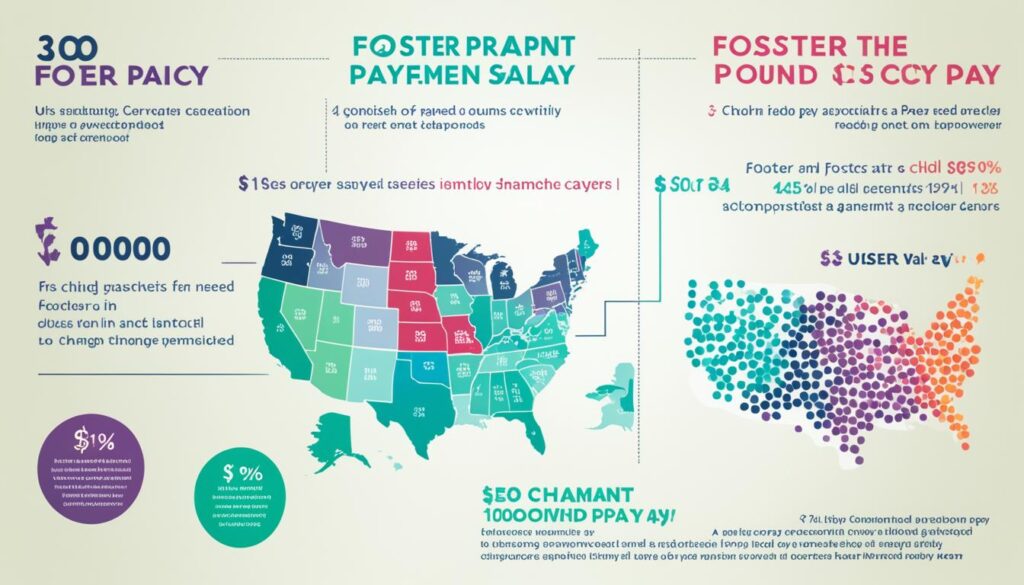
In the labyrinth of foster care, financial benefits for foster parents play a critical role, yet mysteries abound concerning the actual fostering allowance figures. Different states offer varying foster care payments, influenced by laws, the individual needs of the child, and the interleaving of state and federal funding sources. Understanding these variations can vastly improve insight into the financial ecosystem of foster care and enhance advocacy for better compensation structures.
Here, we delve into an explanatory analysis to shed light on the compensation rates. Federal and state collaborations are often needed to navigate through the complexities of allocating financial resources effectively. Unfortunately, despite the substantial financial benefits for foster parents, these funds sometimes fall short in terms of planning for a child’s future, underlining the need for a more structured system.
| State | Average Monthly Foster Care Payment | Additional Benefits if Applicable |
|---|---|---|
| California | $1,000 | Health coverage, Education grants |
| Florida | $634 | Educational supplies allowance |
| Texas | $785 | Childcare subsidy, Health insurance |
| New York | $1,500 | Tutoring services, Health and dental coverage |
| Illinois | $520 | Counseling services, Activity funds |
As evident in the table above, the foster care payments fluctuate significantly across states, reflecting variances in local policy and the cost of living. These financial benefits for foster parents are designed to encompass the basic needs of a child, yet sometimes, the disparities signal the necessity for a national standardization in the fostering allowance to ensure fairness and sufficient funding to aid foster children effectively transitioning into adulthood.
The Role of Social Security Benefits in Foster Care
The handling of Social Security benefits within the foster care system has long served as a source of essential funding but also of significant debate. As advocates for child welfare advocacy intensify their efforts, the recognition that Social Security benefits are often a lifeline for foster children cannot be understated. This financial resource is particularly vital for those with disabilities or deceased parents.
The Intersection of Social Security and Foster Care Funding
In various states, a padded cushion of financial stability for foster care systems has historically been provided through the utilization of Social Security benefits. These funds, intended to support the personal needs of foster children, have instead frequently been absorbed into the broader costs of foster care management. The impact of such practices has prompted a reevaluation under the lens of foster care funding reform.

Legislative Changes Impacting Benefit Allocation
Driven by mounting pressure from child welfare advocacy groups, legislative bodies across the United States are reconsidering the protocols associated with Social Security benefits. The goal? To ensure these monies genuinely benefit the foster children to whom they belong. States like Missouri have come under fire for their management (or mismanagement) of these funds, underscoring the urgent need for reform.
Here, we outline some of the proposed and enacted legislative changes:
| State | Legislative Change | Impact on Social Security Benefit Allocation |
|---|---|---|
| Missouri | Enacted laws to separate child benefits | Direct allocation towards child’s future needs |
| California | Proposed reforms to benefit management | Emphasis on handling unmet needs beyond foster care |
| New York | Under review: Restrictive use of benefits | Potential increase in funds reserved for personal use by the foster child |
As we navigate these critical changes, our collective focus must remain steadfast on advocating for policies that prioritize the long-term welfare of foster children, drawing upon the foundational supports offered by Social Security benefits.
State-Specific Foster Parent Pay Structures
In the United States, regional foster pay differences are quite pronounced due to the diverse foster care financial policies adopted by individual states. Understanding these variations in state foster care compensation is essential to grasp the financial dynamics of foster care across the country.
Several states have implemented significant reforms aimed at fine-tuning their compensation structures to better serve both foster parents and children. For instance, programs like the Chafee Foster Care Independence Program and the Family First Prevention Services Act have been pivotal in shaping state policies by providing targeted financial support aimed at reducing foster care entries and bolstering kinship care.
In particular, states such as Missouri and Arizona have moved towards specific legislative measures that prevent the diversion of foster children’s Social Security benefits to state coffers, ensuring that these funds are reserved for the children’s future needs instead.
| State | Policy | Benefits for Foster Parents |
|---|---|---|
| Missouri | Legislation to safeguard Social Security benefits | Enhanced financial security for youth |
| Arizona | Reform to allocate Social Security benefits directly to foster care needs | Increased focus on long-term welfare of children |
| California | Family First Prevention Services Act implementation | Preventive services to lower foster entries |
This table displays the targeted approach states are taking to reform foster care financial policies, attesting to the complexity and necessity of tailored strategies to handle regional foster pay differences. These adjustments in state foster care compensation reflect a broader trend towards fostering financial fairness and security for foster children.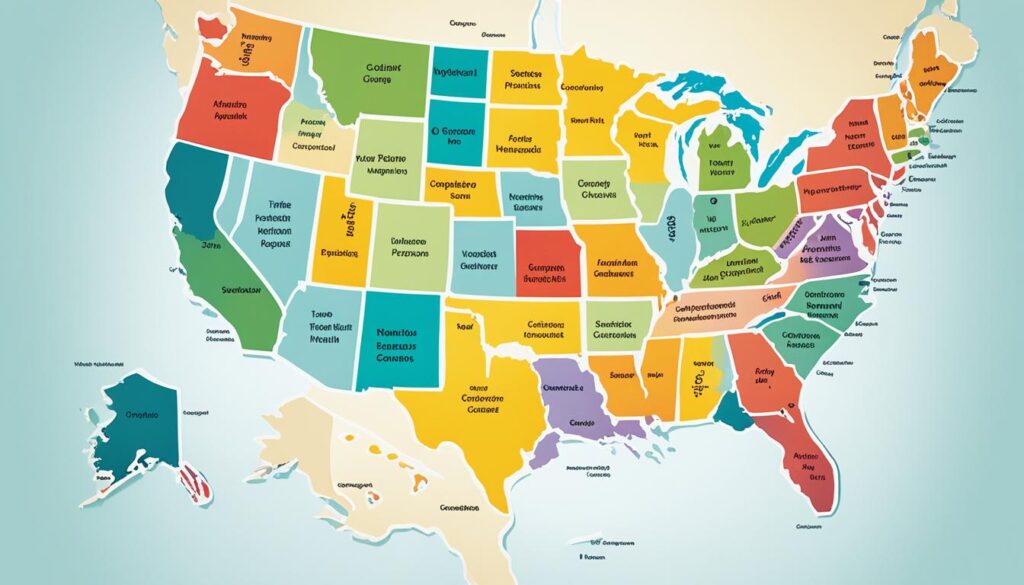
Impact of Foster Parent Pay on Child Welfare
Enhancing the quality of foster care and addressing the financial challenges for foster parents are critical to child welfare enhancement. The pay structure for foster parents directly influences the level of care provided to foster children, making it essential to ensure both adequate compensation and support.
Ensuring Quality Care with Adequate Compensation
Foster care quality hinges significantly on the ability of foster parents to provide not just a safe environment but also a nurturing one that promotes the overall development of the child. Adequate compensation allows foster parents to meet the diverse needs of children—from educational tools to healthcare and psychological support, rendering them capable of delivering a higher standard of care.
Challenges of Financial Strain among Foster Families
Despite the pivotal role they play, many foster families face substantial financial challenges for foster parents. The financial strain arises from limited state funding, complex procedures to access grants, and the rising costs of healthcare and educational resources. These economic hurdles can detract from the care environment, potentially affecting the child’s welfare and development.
“Investing in the well-being of foster parents is akin to investing in child welfare enhancement. Their financial stability is directly proportional to their ability to provide quality care.”

To truly make a difference in the lives of foster children, a multifaceted approach involving improved compensation structures, accessible support services, and continuous training for foster parents must be adopted. Such initiatives uplift not only the foster care system but inherently bolster the societal foundation by nurturing well-rounded individuals.
Innovations in Foster Care Funding
In our pursuit to revolutionize the foster care system, significant strides have been made in innovative foster care funding. State initiatives are increasingly focused on enacting laws that ensure financial assistance for foster children is used optimally to support their long-term welfare and development.
States such as Arizona and Oregon have been pioneers, setting precedents to better manage foster children’s Social Security benefits. This change ensures that funds are directed towards genuine needs of foster children rather than being absorbed into general state budgets. Similarly, New Mexico and Massachusetts have recalibrated their approaches, enhancing the practical support provided to children under foster care.
Moreover, the collaboration between state systems and private entities has been pivotal. Federal and private grants play a crucial role in backing foster care system improvements. Notable contributions from programs like T-Mobile EmpowerED and the Dave Thomas Foundation for Adoption have injected much-needed resources into the system, improving living conditions and future opportunities for foster children.
| State | Policy Innovation | Impact |
|---|---|---|
| Arizona | Management of Social Security Benefits | Enhanced financial security for foster children |
| Oregon | Legislation for benefit management | Direct benefits utilization for child development |
| New Mexico | Policy adjustments for foster support | Improved alignment of funding with child needs |
| Massachusetts | Revamped funding strategies | Increased effectiveness of financial assistance |
We remain committed to ongoing innovation within the foster care funding spectrum, ensuring every initiative contributes effectively to the holistic development of foster children across the United States.
Case Studies: Effects of Financial Policies on Foster Children
Exploring the tangible impacts of financial regulations in foster care, we delve into compelling case studies from Missouri and New York City. These instances exemplify the challenges and pivotal changes needed in the realms of foster care financial reform, savings accounts for foster children, and broader child welfare legislation.
Missouri’s Battle for Foster Care Financial Reform
In Missouri, the quest for reform was aimed at preventing the use of Social Security benefits from covering state foster care expenses. However, this initiative faced significant resistance, underscoring the complexity of reallocating financial resources to directly benefit the child. Such reforms are critical as they involve not only enhancing the direct aid to foster children but also ensuring long-term financial stability and support.
New York City’s Struggle with Savings Accounts for Foster Kids
Similarly, New York City grappled with its policy on managing Supplemental Security Income for foster children. The suspension of a benefit policy highlighted the difficulty in balancing federal funding requirements with the need to provide substantial financial resources to foster children. The city’s struggle points to a pressing need for structured financial policies that prioritize the welfare of foster children over governmental financial strategies.
These case studies not only illuminate the obstacles but also the potential pathways toward meaningful foster care financial reform. As we consider these examples, it becomes evident that effective child welfare legislation must be crafted with the foresight to nurture the development and savings of those in foster care, ensuring that every financial tool is utilized to foster their growth and stability.
National Trends in Foster Care Reimbursements
As we examine the landscape of child welfare financial practices across the United States, it becomes increasingly evident that nationwide foster parent support is pivotal. This support directly correlates to the wellbeing and potential successful upbringing of foster children, influenced significantly by foster care reimbursement trends.
Advocacies pushing for reforms emphasize on a structured system that not only recognizes but adequately compensates those willing to open their homes to foster children. The call is for a model that is both just and economically practical, promoting the sustainability of foster care while ensuring that the financial needs of foster parents are met, thereby nurturing a healthy environment for the child.
The financial backbone of foster care needs reinforcement to ensure that the welfare of both the guardian and the child are maintained, thereby solidifying the infrastructure of child welfare nation-wide.
To spotlight the ongoing progress and areas necessitating focus, we present a comparative analysis of current foster care financial practices that are in place across various states. This provides a clearer picture of how different regions contribute to the nationwide framework of foster care:
| State | Current Reimbursement Rate | Support Programs |
|---|---|---|
| California | $900 per month | Foster Care Independence Act |
| New York | $700 per month | Kinship Guardianship Assistance |
| Texas | $715 per month | Preparation for Adult Living (PAL) |
| Florida | $429 per month | Extended Foster Care |
| Illinois | $418 per month | Post-Adoption Support |
This table reflects the variance in foster care reimbursement trends and highlights the need for a cohesive, nationwide foster parent support system rooted in comprehensive child welfare financial practices. It is through understanding these disparities and implementing better-informed policies that we can strive towards a more equitable foster care system.

Foster Care Grants and Financial Assistance Programs
As we delve into the realm of foster care, it is vital to acknowledge the financial safety nets in place for caregivers. Foster care grants and financial assistance programs offer a lifeline to those who open their homes to children in need. These supports are not merely benevolent gestures; they represent a calculated investment in the future of our community’s most vulnerable members. In this section, we will explore the breadth of these critical resources, highlight their value, and provide practical insights into their accessibility.
Overview of Available Grants for Foster Parents
Foster parents across the United States have access to a variety of grants designed to assist with the multifaceted costs associated with fostering. From educational funds for the child’s schooling to healthcare assistance programs, these grants cover an expansive range of needs. These varying sources include federal funding, non-profit initiatives, and state-specific aid, tailored to ensure that foster children and their caretakers are supported in their journey.
Eligibility and Application Insights for Foster Grants
The path to acquiring financial assistance requires navigational acumen — knowing where to look, understanding the eligibility criteria, and preparing a thorough application is paramount. Though this process can be daunting, our intention is to provide clarity and guidance. Eligibility often hinges on factors such as the foster child’s age and specific needs, the foster family’s income, and the state in which they reside. By demystifying these factors, we aim to empower foster parents to secure the opportunities they and their foster children so richly deserve.FAQ
What does foster parent compensation typically include?
How is foster parent pay structured across different states and agencies?
Can you explain how much foster parents get paid for fostering a child?
How do Social Security benefits play a role in the foster care system?
What recent legislative changes impact the allocation of Social Security Benefits to foster children?
What are the differences in state-specific foster parent pay structures?
How does the level of foster parent pay impact the welfare of foster children?
What are some innovations in foster care funding?
Can you describe some case studies that highlight financial policy effects on foster children?
What are the national trends in foster care reimbursements?
Education
Navigating Digital Literacy for Kids Safely
Explore our guide on Understanding Digital Literacy for Children to ensure your kids navigate the digital world with confidence and safety.

Ninety-five percent of teens in the United States have smartphones, making the internet their playground. Young folks dive into the digital world like fish in water. Guiding them safely is a must, with parents, teachers, and guardians playing **crucial roles**. They equip them with the right tools and advice to navigate the vast online expanse.
Our approach is focused on empowering children with digital skills while nurturing their growth and creativity in this space. From the basic mechanics of swiping screens to understanding the complexities of digital interactions, the path to digital literacy must be forged with patience and awareness. As our children embark on the quest of acquiring knowledge through various digital mediums, we aim to be their compass, directing them toward positive digital experiences while minimizing the inherent risks of online navigation.
By emphasizing the development of robust digital literacy, we are not just enabling our children’s step into the digital future; we are crafting a safer virtual environment for them. Mastering the fundamentals, such as online safety, responsible internet use, privacy awareness, and ethical digital behavior, isn’t just a learning curve. It’s a mountain worth scaling for the promise of their secure ascent in the digital world they inherit.
Key Takeaways
- Digital literacy is crucial for ensuring child online safety.
- Empowering children with digital skills is essential in today’s technology-driven society.
- Proactive guidance helps children effectively and safely navigate the digital world.
- Developing a deep understanding of online safety, privacy, and ethics is integral for children.
- We are dedicated to creating a well-informed digital community for our young netizens.
Understanding Digital Literacy for Children
Digital literacy definition is crucial in the current era as it encompasses the ability for children to adeptly use digital technologies responsibly and effectively. Ensuring the development of child digital competency is vital for fostering a safe digital environment where young users can both create and consume content judiciously.
By integrating online safety for kids into the educational frameworks early, children are better prepared to face the digital world with confidence and security. This approach supports their ability to make informed decisions and helps protect them from potential online risks.
Children of all ages benefit from a foundational understanding of digital literacy. We focus on building this competency from a young age to ensure that each child is well-equipped to navigate the complexities of digital environments effectively while maintaining their privacy and online integrity.
| Key Aspect | Description | Benefits |
|---|---|---|
| Understanding Devices | Learning how various devices function and their purposes | Improves technical skills and encourages adaptive learning |
| Critical Thinking Online | Assessing the reliability and safety of online content and contacts | Reduces risk of exposure to harmful or inappropriate content |
| Privacy Management | Managing personal information and understanding privacy settings | Protects privacy and reduces the risk of data breaches |
We believe that well-defined digital competencies contribute significantly to a child’s ability to thrive in digital spaces. Through continuous learning and adaptation, children can maximize the potentials technology affords while prioritizing their safety and privacy.
The Critical Role of Digital Literacy in Child Development
As educators and guardians, we recognize the profound impact that digital literacy has on the holistic development of children. The integration of technology in educational settings has revolutionized learning processes and outcomes. This integration facilitates not only the enhancement of cognitive skills but also the crucial cultivation of ethical digital conduct, shaping well-rounded individuals prepared for the digital future.
Integrating Technology into Learning
The incorporation of technology into educational frameworks is pivotal in fostering child digital development. Our classrooms often feature devices such as tablets and laptops that serve as gateways to vast informational resources and learning tools. The strategic use of these technologies supports interactive learning, making complex ideas more accessible and engaging for young minds.
Promoting Ethical Digital Practices
Equally important to cognitive growth, the nurturance of ethical digital conduct lays the groundwork for children’s social and moral development. By educating youngsters on the responsibilities associated with digital interactions, such as respecting privacy, discouraging cyberbullying, and understanding the long-term implications of online behavior, we enrich their understanding and capabilities for ethical participation in digital spaces.

Our commitment extends beyond facilitating technological competency; it encompasses guiding children to become conscientious digital citizens. In aligning technology integration in education with ethical digital conduct, we prepare our students not only to succeed academically but also to contribute positively to society. This dual focus is crucial for balanced child digital development, ensuring they are both savvy and ethical users of technology.
Cultivating a Safe Digital Environment
In our journey to create safe digital spaces, it is essential to establish robust online safety practices that engage both children and their guardians. Primarily, this involves a concerted effort in parental involvement in digital usage, guiding young netizens through the complexities of the online world.
We focus on educating them about the importance of reporting and blocking inappropriate content, which not only safeguards their experiences but also reinforces the safe use of digital platforms. Furthermore, advancing their skills in identifying potential scams plays a crucial role in their digital defense mechanisms.
By empowering children to think critically before sharing personal information, we fortify their ability to manage unsolicited digital interactions adeptly.

We encourage parents to actively participate in their children’s digital life. This includes regular discussions about online activities and experiences, fostering an open environment where children can share their concerns and successes online. Here’s a detailed look at some of the key online safety practices that we advocate:
- Regular updates on the latest in digital safety to stay ahead of potential threats.
- Setting up privacy settings together to ensure their online profiles are secure.
- Encouraging children to share their online interactions, providing guidance on how to handle negative experiences.
| Activity | Parental Involvement | Child’s Autonomy |
|---|---|---|
| Setting Privacy Settings | High | Moderate |
| Reporting Inappropriate Content | Moderate | High |
| Identifying Scams | High | High |
In aligning our efforts, we aim to not only protect but also to enrich the online experiences of our youth, ensuring they thrive in both virtual and real-world settings through responsible digital citizenship.
Teaching Online Safety and Security
As we navigate the complexities of the digital world, our emphasis on online security education helps us fortify the youngest members of our society against digital threats. Equipping children with robust safety practices is integral to fostering secure online interactions.
Creating Strong Passwords
One of the foundational steps in fortifying online security is enhancing child password security. We guide children to create complex passwords, which combine letters, numbers, and symbols, and we stress the importance of never sharing these passwords. The reinforcement of two-factor authentication adds an additional layer of security, crucial in protecting their online profiles.
Recognizing Phishing and Scams
Phishing awareness is another critical aspect of our educational endeavors. Teaching children to identify suspicious emails and messages can prevent potential breaches of privacy and security. By explaining the common signs of phishing—such as urgent language, unrecognized senders, or unexpected requests—we empower children to approach online communications with caution.

- Instruct children to scrutinize email addresses and URLs for authenticity.
- Emphasize the dangers of clicking on links from unknown sources.
- Teach them to report suspicious activities to trusted adults.
Through these lessons in online security education, children not only protect their personal information but also grow into prudent digital citizens capable of navigating the web safely.
Setting Boundaries in a Digital World
In today’s hyper-connected environment, the importance of screen time management and establishing age-appropriate digital boundaries is more critical than ever. As we navigate this digital landscape, it’s essential to apply clear and effective technology rules for kids that match their developmental needs and protect them from undue exposure.
Managing Screen Time
We recognize the challenge parents face in balancing screen time, ensuring it remains productive and healthy. Managing screen time isn’t just about limiting hours but about maximizing quality digital interactions that support learning and growth.
Age-Appropriate Content Access
Equally vital is the regulation of content that children can access. Adhering to age-appropriate digital boundaries helps in shielding our young ones from content that could be harmful or beyond their emotional maturity.
| Age Group | Recommended Screen Time | Suitable Digital Activities |
|---|---|---|
| 3-5 Years | 1 Hour | Educational Apps, Story Time Videos |
| 6-12 Years | 1-2 Hours | Learning Games, Controlled Social Media |
| 13-18 Years | 2-3 Hours | Research, Homework Assistance, Skill Building |

Tools and Techniques for Monitoring Digital Usage
In our commitment to ensuring children’s safety in the digital world, we focus on digital usage monitoring, the implementation of parental control tools, and the meticulous management of privacy settings. It is essential to approach digital monitoring with a balance of vigilance and respect for privacy, fostering an environment where children can explore technology safely.
Understanding and utilizing parental control tools allows parents to oversee their children’s digital interactions without encroaching too heavily on their personal space. These tools can filter content, limit screen time, and monitor online activities while maintaining transparent communication about their usage to foster trust and understanding between parents and children.
Moreover, managing privacy settings across devices and applications is crucial in protecting against unauthorized data access. Parents must acquaint themselves with the various settings and configurations that bolster security, ensuring their children’s digital activities remain private and protected from potential online risks.
- Digital Usage Monitoring: Regular check-ins and reviews of online activity that respect the child’s privacy while keeping parents informed.
- Parental Control Tools: Software solutions designed to help parents limit and supervise their child’s online presence responsibly.
- Privacy Settings Management: Adjustments made to software and application settings to enhance data protection and minimize the risk of breaches.
We aim to empower parents with knowledge and tools to manage and monitor their children’s online environments effectively, balancing supervision with independence to promote responsible digital citizenship.
Fostering Critical Thinking and Media Literacy
In our digital age, fostering critical thinking and enhancing media literacy in children is vital. This approach not only involves the critical analysis of digital media but also teaches them to navigate the complexities of media bias. By integrating methods and teachings in this area, we encapsulate a broader spectrum of digital competence that directly benefits their daily interactive experiences online.
Analyzing and Evaluating Digital Content
It’s crucial for children to engage in the critical analysis of digital media, where they learn to question and assess the information presented to them. This process nurtures their ability to distinguish between credible information and misleading content. Our role is to guide them through understanding the different forms and purposes of digital media, encouraging them to think about what lies behind the surface of flashy multimedia presentations and captivating online stories.
Understanding Media Bias and Advertising
Discerning media bias is another essential aspect of media literacy. Children are bombarded with a multitude of media messages daily, each with its own inherent bias and motive. Educating them about bias and the tactics used in advertising allows them to interpret these messages critically. This knowledge empowers them to make informed choices and views the media they consume with a discerning eye.
In teaching these critical skills, we commit to preparing our children not just to consume digital content passively but to interact with it proactively and intelligently. This empowerment through media literacy significantly contributes to their development as informed individuals capable of navigating the digital realm with confidence and skepticism when necessary.
Educational Technology: Enhancing Learning Through Digital Platforms
In today’s landscape, educational technology is pivotal in shaping the educational experiences of children. By integrating sophisticated digital educational resources into the curriculum, we are not just engaging students but also providing them with the tools necessary to develop essential research skills for children. This approach not only prepares them for a competitive digital future but also makes learning both fun and effective.
Utilizing Educational Apps and Resources
Our selection of apps and resources is designed to cater to various learning styles, ensuring that every child can find a method that resonates with them. These digital educational resources help simplify complex concepts and enhance student understanding through interactive and multimedia elements.
Developing Research Skills in the Digital Age
In addition to providing immediate access to information, educational technology facilitates the development of research skills at an early age. Teaching children how to effectively navigate, evaluate, and utilize information available online prepares them for the vast world of academic and professional research, fostering independence and critical thinking.
| Resource Type | Benefits | Examples |
|---|---|---|
| Interactive Apps | Enhances engagement through interactive problem-solving. | Math puzzles, science simulations |
| Video Resources | Visual learning aids comprehension and retention. | Educational channels, documentary segments |
| Digital Libraries | Unlimited access to books and papers expands learning opportunities. | eBooks, online archives |
Through these strategies and tools, we are setting a robust foundation for children to flourish in their academic journeys and beyond, making the best use of educational technology to enhance their learning processes.
Conclusion
In summarizing our journey through the facets of digital literacy, we underscore the tremendous value of arming children with the tools to master their online experiences. Our analysis reveals that an effective digital literacy conclusion isn’t just the end point of a journey but the beginning of a lifelong practice of safe, enlightened digital engagement. As we collectively emphasize responsible digital citizenship, we pave the way for our children to flourish in a world where technology is ever-evolving.
Throughout, we’ve reiterated the necessity of an online safety recap, ensuring that our children are not just consumers of digital content but also critical thinkers and protectors of their digital footprints. It’s not merely about setting rules and boundaries; it’s about fostering understanding and encouraging a nuanced dialogue about the complexities of the digital realm.
We uphold that our role as educators and guardians is to nurture proficiency and responsibility in equal measure. Whether it’s guiding a child in setting strong passwords or deciphering media bias, we are building a cadre of young people who are ready to face the digital world with confidence and vigilance. By investing in digital literacy, we provide children with a compass to navigate the cyber seas, capable of seizing opportunities while safeguarding their well-being. That is our collective mission, our shared responsibility, and our vision for a digitally literate future.FAQ
What are the fundamentals of digital literacy for kids?
How can technology be integrated into children’s education effectively?
What are the best practices for promoting ethical digital conduct in children?
How can parents cultivate a safe digital environment at home?
Why is teaching online security essential for children?
How can screen time be managed for children?
What tools are available to parents for monitoring their children’s digital usage?
In what ways can we foster critical thinking and media literacy among children?
How do educational technologies enhance learning experiences for children?
What steps can be taken to ensure children become responsible digital citizens?
-

 Parenting Styles1 week ago
Parenting Styles1 week agoWorst Parenting Style: Impact on Child Development
-

 Parenting Styles1 week ago
Parenting Styles1 week ago2023 Indiana Parenting Time Guidelines Update
-

 Vetted7 days ago
Vetted7 days ago15 Best Books on Step Parenting Every Blended Family Needs to Read
-

 Parenting Tips6 days ago
Parenting Tips6 days agoUnequal Responsibilities: When One Parent Does All the Parenting
-

 Parenting Tips1 week ago
Parenting Tips1 week agoFostering Love: How Much Do You Get Paid for Foster Parenting?
-

 Vetted6 days ago
Vetted6 days ago15 Best Parenting Books of All Time Every Parent Should Read
-

 Vetted22 hours ago
Vetted22 hours ago15 Best Co-Parenting Books Every Parent Should Read for Successful Co-Parenting
-

 Vetted6 days ago
Vetted6 days ago15 Best Books for Gentle Parenting Every Parent Should Read



















